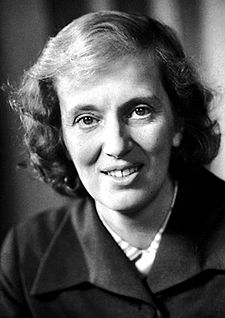Dorothy Hodgkin
| Dorothy Hodgkin | |
|---|---|

Dorothy Hodgkin
|
|
| Born | Dorothy Mary Crowfoot 12 May 1910 Cairo, Egypt |
| Died | 29 July 1994 (aged 84) Ilmington, Warwickshire, England |
| Residence | England |
| Nationality | British |
| Fields | Biochemistry, X-ray crystallography |
| Alma mater | |
| Doctoral advisor | John Desmond Bernal |
| Doctoral students | |
| Other notable students |
|
| Known for |
|
| Notable awards |
|
| Spouse | Thomas Lionel Hodgkin (m. 1937) |
| Children | Luke, Elizabeth, and Toby |
Dorothy Mary Hodgkin OM FRS (12 May 1910 – 29 July 1994), known professionally as Dorothy Crowfoot Hodgkin or simply Dorothy Hodgkin, was a British biochemist who developed protein crystallography, for which she won the Nobel Prize in Chemistry in 1964.
She advanced the technique of X-ray crystallography, a method used to determine the three-dimensional structures of biomolecules. Among her most influential discoveries are the confirmation of the structure of penicillin that Ernst Boris Chain and Edward Abraham had previously surmised, and then the structure of vitamin B12, for which she became the third woman to win the Nobel Prize in Chemistry.
In 1969, after 35 years of work and five years after winning the Nobel Prize, Hodgkin was able to decipher the structure of insulin. X-ray crystallography became a widely used tool and was critical in later determining the structures of many biological molecules where knowledge of structure is critical to an understanding of function. She is regarded as one of the pioneer scientists in the field of X-ray crystallography studies of biomolecules.
Dorothy Mary Crowfoot was born in Cairo, Egypt, to John Winter Crowfoot (1873–1959), an archaeologist and classical scholar, and Grace Mary Crowfoot née Hood (1877–1957), an archaeologist and expert on Ancient Egyptian textiles. She lived in the English expatriate community in Egypt, returning to England only a few months each year. During one of those stays in England, when Hodgkin was four, World War I began. Her mother lost four brothers in the war. Separated from her parents, who would return to Egypt, she was left under the care of relatives and friends until after the end of the war when her mother came to England for one year, a period that she later described as the happiest in her life.
...
Wikipedia
